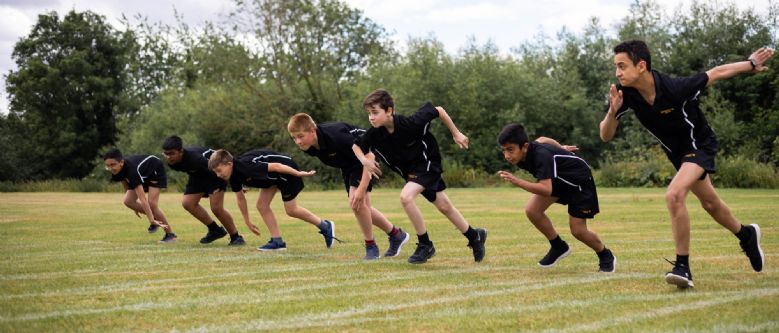GCSE Physical Education
Pupils will receive a well-rounded education to the world of sport performance and sport science by developing an understanding of how the mind and body works in relation to performance in physical activity.
Structure of the course in Key Stage 4
Pupils will have 2 lessons of GCSE PE a week. These lessons will be predominantly theory based and will focus on the two examination papers and the written coursework that makes up 70% of the course.
The remaining 30% is practically based and is covered within some GCSE PE and core PE lessons. Pupils are assessed in a variety of sports within schools and are externally moderated. Their best three scores give the total grade. It is expected that pupils participate in at least one sport outside of school.
Content of the course
Component 1 |
Component 2 |
Component 3 |
Component 4 |
|
Fitness and Body Systems |
Health and Performance | Practical Performance | Personal Exercise Programme (PEP) |
|
Topic 1: Applied anatomy and physiology Topic 2: Movement analysis Topic 3: Physical training Topic 4: Use of data |
Topic 1: Health, fitness and well-being Topic 2: Sport psychology Topic 3: Socio-cultural influences Topic 4: Use of data |
One team activity. One individual activity One free choice a further individual or team activity |
Aim and planning a training program. Carrying out and monitoring improvements in your performance. Evaluation of your 6-week training program. |
Assessment in the subject
Component 1 |
Component 2 |
Component 3 |
Component 4 |
|
Written examination 36% of the qualification 1 hour and 45 minutes 90 Marks |
Written examination 24% of the qualification 1 hour and 15 minutes 70 Marks |
Practical Exam 30% of the qualification 35 Marks per activity 105 marks |
Written Coursework 10% of the qualification 20 Marks |
The practical examination consists of 3 activities.
- One individual activity
- One team activity
- One other choice. Either a team or individual activity from the list below.

Individual Activities
Amateur boxing, Athletics, Badminton, Canoeing, Cycling, Dance, Platform diving, Equestrian, Figure Skating, Golf, Gymnastics, Kayaking, Rock climbing, Rowing, Sculling, Skiing, Snowboarding, Squash, Swimming, Table tennis, Tennis, Trampolining and Windsurfing. Specialist Activities; Boccia and Polybat.
Team Activities
Acrobatic Gymnastics, Association Football, Badminton, Basketball, Camogie, Cricket, Dance, Figure Skating, Futsal, Gaelic football, Handball, Hockey, Hurling, Ice Hockey, Inline roller Hockey, Lacrosse, Netball, Rowing, Rugby league, Rugby union, Sailing, Squash, Table tennis, Tennis, Volleyball and Water polo. Specialist Activities; Blind cricket, Goal ball, Powerchair football, Table cricket, Wheelchair basketball and Wheelchair rugby
Pathways Post 16
GCSE PE links to A Level PE at a further education and 6th form colleges. A level PE is a rigorous and academic subject accepted by all Universities including Russell Group Universities (top 24 in the UK.)
The course should appeal to anyone on pathway 1 who plays sport outside of school or is willing to represent the school teams in a variety of sports and has an interest in the human body, PE lessons and sport. Related careers may include; the armed forces, emergency services, nutritionist, physiotherapist, physical training instructor, sports coach, teacher or sport scientist.
Extra-curricular opportunities
Pupils would be expected to represent the school in sports that they are being assessed in for their GCSE practical performance. We would encourage GCSE PE pupils to apply for PE prefect status in year 11 and encourage our GCSE PE pupils to help support teachers with the delivery of Key Stage 3 extra-curricular clubs. Additionally, through the course we offer pupils the opportunity to visit Loughborough University to experience some sport lectures, a tour around their world class sport facilities and participate in some practical sports.
FAQs
Does doing PE mean I have more practical lessons?
Within your two lessons a week, there will be the equivalent of one practical lesson every two weeks. The focus of these lessons maybe based around theory content or completing practical assessments for the pupils three sports. PE staff will, where possible, deliver theory content in a practical setting to further improve learning opportunities.
What other subjects does it go well with?
The GCSE PE course consists of a wide variety of subject areas. The closest linking subjects would be biology, alongside some psychology and also mathematics with the use of data now adding value to the overall mark.
Can I use my sports that I play currently?
The list of sports allowed can be found above. If your sport or hobby is on that list, then it can be used. We will assess you in one of two ways. If you compete in a sport outside of school that we do not offer as part of the school curriculum you would be expected to film yourself training and in competitive situations to secure your mark.
Do I still get to do PE if I don’t choose GCSE?
Yes. All pupils will get one lesson of core PE per week.
